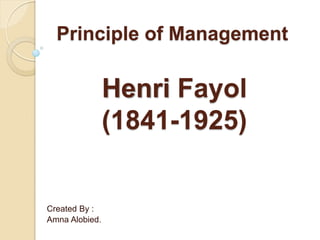
Henri fayol
- 1. Principle of Management Created By : Amna Alobied. Henri Fayol (1841-1925)
- 2. Introduction While people gave Taylor more attention in UK and USA , Fayol’s distinguished book ” General and Industrial Management” was translated from French to English only after 13 years. Administrative management theory attempts to find a rational way to design an organization as a whole.
- 3. The theory generally calls for a formalized administrative structure, a clear division of labor, and delegation of power and authority to administrators relevant to their areas of responsibilities and administrative management theory important because its Promote decisions based on data . Administrative management helps you work on your processes and results to improve your overall results and ensuring that businesses run smoothly.
- 4. The Three Contributions Mainly, Fayol offered three contributions: 1. management activities. 2. management functions 3. the fourteen management principles.
- 5. Management Activities As for management activities, Fayol classifies industrial and commercial organizations into six basic activities: 1. Technical. 2. Financial. 3. security. 4. commercial. 5. Accounting. 6. management activities.
- 6. Management Functions As for functions of management stated seven management functions abbreviated in the word POSDCORB which includes: 1. Planning. 2. Organizing. 3. staffing and supervising. 4. directing. 5. controlling. 6. Reporting and. 7. Budgeting.
- 7. The 14 Management Principles The third and most critical, contribution offered by Fayol is the 14management principles. Fayol emphasized two facts here: first these principles should be recognized as an aggregated managerial tool which means that they work together as a combination or sum total. Secondly, these principles should be applied with flexibility that even new managers could learn how to manage.
- 8. 1- Division of work To ensure work being easy to perform by individuals and groups. To achieve specialization and integration.
- 9. 2- Authority & Responsibility means “power” the right to give order and expect obedience
- 10. 3- Discipline employees should adhere to rules and regulations * and marks of respect to the organization system
- 11. 4- Unity of command Every employee should receive orders from only one Supervisor or behalf of the superior.
- 12. 5- Unity of direction Each group of organizational activities that have the same objective should be directed by one manager using one plan for achievement of one common goal.
- 13. 6- Subordination of the individual the goals and interests of the organization are more important than the goals of the individuals and group and, consequently, they should supersede over them.
- 14. 7- Remuneration each employee should receive fair compensation that match his contributions to the organization.
- 15. 8- Centralization & Decentralization managers are responsible for decision- making and are accountable for these decisions. In smaller firms , centralization is observed In larger firms , a series of intermediaries are required. According to fayol company must not be completely centralization or decentralization .
- 16. 9- Scalar chain There should be a scalar chain of authority and of communication ranging from the highest to the Lowest Level . Communications should follow this chain. However if someone needs to communicate some other person in emergency he/she might use "Gang Plank".
- 17. 10- Order To arrange both human and physical resources in the right place at the right time to ensure maximum efficiency.
- 18. 11- Equity Equity means to be kind , fair and just treatment to employees. It brings Loyalty to the Organization . rules are reasonable and consistently applied on all workers ensuring equal (although not necessarily identical) treatment.
- 19. 12- Stability of personnel human resources are invaluable assets that should be retained to ensure long-run commitment to the organization.
- 20. 13- Initiative its is the ability, opportunity, and power to act before others. it is the ability to design an instant plan and ensuring its success
- 21. 14- Esprit de corps Every employee in the organization must consider him as a part of a team and try to achieve the team goal because team contribution is always better than individual contribution.
- 22. Henri fayol developed the 14 principles of management According to its specialization promotes efficiency of the workforce and increases productivity, This is why Fayol is counted as "the father of modern management